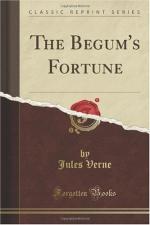|
This section contains 402 words (approx. 2 pages at 300 words per page) |

|
The Begum's Fortune is a fantasy novel, and part of what we today call science fiction. Verne was one of the first to use the genre, a mix of futuristic technology and adventure. His influence on other writers of science fiction is enormous. H. G. Wells, who wrote such classics as the Time Machine (1895; see separate entry), and War of the Worlds (1898; see separate entry), recalled that during his early years he "was welcomed as a second Dickens, a second Bulwer Lytton, a second Jules Verne." Another heir to Verne is Edgar Rice Burroughs in his Mars stories, which are set in futuristic cities full of Utopian inventions.
Verne's scientific novels are a unique brand of industrial age literature, and have found their heirs in the twentieth as well as the nineteenth century. Arthur C. Clarke, William Tenn, Robert Heinlein, Ray Bradbury, and Robert Sheckley are...
|
This section contains 402 words (approx. 2 pages at 300 words per page) |

|




